“This is London, this is London.
At this moment it is communicated"...


These were the first words the Danes heard on the broadcast sent out from London to the many illegal radio receivers in Denmark. This is the story of one of the many English Tommies, who participated in some of the World War Two greatest battles and finally found the love of his life in the little Kingdom, Denmark.
By Kim Frost Fuglsang
The freedom message from BBC London had just sounded on the evening of 4th May 1945 on many of the many illegal radios around the small Danish homes. An unreal and different mood had hit the country and both joy, chaos, grief and confusion ruled the population. That night would forever be embedded in people's memory - where they were, what they wore and who they were with in that particular moment.
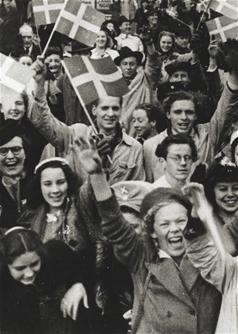 After the great joy, that had waved over the country the evening of the fourth of May, everything was still so unreal. The early morning hours of sunlight streamed into the many homes across the country now after people had torn their blackout curtains down after the liberation message on the radio. This was indeed the end to what was to be known as the “5 black years”.
After the great joy, that had waved over the country the evening of the fourth of May, everything was still so unreal. The early morning hours of sunlight streamed into the many homes across the country now after people had torn their blackout curtains down after the liberation message on the radio. This was indeed the end to what was to be known as the “5 black years”.
5 years under German occupation had left its traces in the population. People were still suspicious and hesitant as everything was still so uncertain. Many questions were left hanging in the air... "How would the Germans react when they had to lay down their weapons?"
" Would it come to fierce street battles or would the entire peace process be carried out quietly?”
And what about the Communists, who had played a prominent role among the Danish partisan activities against the German Wehrmacht? "Would they exploit the transition to take power in the country?" Many questions and so few answers. There were reports of fierce fighting in cities like Odense, between Danish partisans and German troops. Or was it fightings between different fractions of the Danish partisan organisations? Was it all the fruit of hidden agendas within the resistance movements and, in fact, the start of a civil war in Denmark between communists and fascists?
Rumours about local showdowns with German friendly Danes and punishment of the so-called "field mattresses" were also spreading across the country. These girls had committed the sin of falling in love with one of the many young Wehrmacht soldiers in Denmark. In spite of all this feeling of insecurity the main feeling in the Danish population was still a prevalent belief in a bright future further helped along by the mild weather of spring. The Danish radio media had once again begun to broadcast with the "old" speakers at the microphone, and the news flow was being re-established to peacetime conditions with use of a free press.
May 3rd 1945 -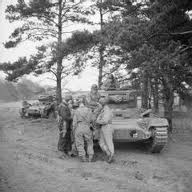
Well south of the Danish / German border, sat the young Leslie James with his brothers at arms and looked up at the stars on this beautiful night in the early spring. They sat and drank one of those many "nice cup of teas", which had been effective as a decoupling from the horrors of war. Leslie, or "James", as his comrades normally greeted him. was a private in "The First Royal Dragoons." As always, rumours had spread faster than the official communication lines: "The Germans were very close to a final and unconditional capitulation. Monty would soon receive the official surrender after which all German resistance would cease irrevocably."
What exactly this would mean for James and his unit was still quite unclear to them. There was still uncertainty of what the Bolsheviks were up to. Were they considered our friends ? This sort of big political questions were a little hard to keep track of when you were only a private in the British army. Other questions of a more private character were about James and his unit. Would they immediately be sent home to to be put ashore as civilians? Or were other military tasks waiting ahead?
In a strange way, James' feelings were very divided. First, he was obviously happy that the war finally seemed to ebb away which meant that he could begin to look ahead. On the other hand, there was a lot of uncertainty associated with freedom. What should he do as a civilian? How did he want to dedicate his life? Could he at all operate in a calm and civilian life after more than 6 years with death lurking around every tree or corner.
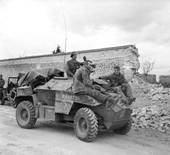
From 1938, when he joined as a volunteer in "The Royal Dragoons," James had been on constantly active duty.
His service started in Palestine where he and his unit had the task of keeping Jews and Arabs separated to avoid an acute conflict in this sensitive area. This was carried out on horse-back with swords in the good old British Colonial way. James, who originally came from London, had skipped a solid apprenticeship as a car mechanic in in the age of 22 to join the Imperial British Army, which undoubtedly rose from his desire for adventure and wish to experience the world.
During service in "The Royal Dragoons" James and his buddies had built a strong and close comradely ties. A handful of them had even managed to stay together all the way from El Alamein where, in the hot desert, hell was the order of the day in constant battles with the German Africa Corps. James and his unit were amongst the first to break through the German lines out into open desert. Later they moved up through Italy.
These tough years, with many traumatic experiences, James certainly could have done without and which he constantly tried to repress and taught him to take life at one day or even hour at a time. In some ways this gave him a sense of security not to think too long forward, and right now he enjoyed just sitting with his faithful brothers in arms enjoying the lovely and mild spring evening with a cup of hot tea, while they could hear the cannon thunder in the distance. There were already rumours that their unit would be part of the contingent who were supposed to cross the Danish / German border to participate in the official liberation of - a small country, which he basically only knew from quality butter and lean bacon. Tomorrow they would probably receive their orders and then they just had to take it as it came and otherwise care for each other as they used to.
uuuuu
May 5th 1945 -
In Denmark, there was still confusion in the streets. There were unconfirmed reports that armed Danish military personnel would arrive in from neutral Sweden. Not that many ordinary Danes knew any details about, what is later to be known as “The Danish Brigade”, but the news spread and created an expectation that it could mean more security for the citizens considering that the Danish police and Army had not been active for the past few years.

The streets were still dominated by young men wearing the official stribed freedom fighters arm bands, driving around the streets with seized vehicles and loaded handguns. The general population did not really know what was going on and there was a widespread perception that it was remarkable how young many of the so-called freedom fighters were. Rumour even claimed that many of these "wild boys" had just jumped out as freedom fighters after the Germans had surrendered. In fact the vast majority of them had taken part in the actual struggle for freedom during the occupation. These young people were often armed with the weapons discarded by the Germans, and one consequence of their brief instruction in weapon handling was the incidence of accidental gunshot wounds.
Unconfirmed rumours were heard across the country that the island Bornholm, closest to the southern part of Sweden, was bombed by the Russians and that the island was cut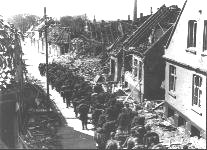 off from the outside world. There was confusion about what the cause of this aggressive action might be. Russians were after all our allies ..? Or were they?
off from the outside world. There was confusion about what the cause of this aggressive action might be. Russians were after all our allies ..? Or were they?
During the confusion in the rest of the country it was quite strange that the official Denmark did not act more progressively. Basically Bornholm was left to itself, and the Russian bombardment caused great resentment among the natives. The Germans had clearly informed the Allies that they were ready to surrender unconditionally to the British. They did not want to surrender to the "Bolsheviks", as it was feared there would be terrible consequences for the German forces, refugees and local population. Civilians in both urban Rønne and Nexø on the island were bombed with great destruction to follow. Civilians were fortunately evacuated early, so the loss of human was minimal. While civilians from a distance could see the light Russian bombers, flown by both male and female Russian pilots, throw their bomb loads over the towns, there were only a few Danish air defence personnel and German firefighters available to get the fire under control. Meanwhile, most Danish firefighters fled to safety outside the city along with the rest of the civilian population. In these early days of May 1945, many natives of Bornholm felt very far away from the rest of Denmark.
uuuuu
May 4th 1945 - North Germany
South of the Danish / German border, James and his comrades finally received their orders. It was now evening, May 4th. They were ordered to cross the border as soon as possible and take care of Denmark's security after the German capitulation. The Germans had finally bowed their heads and surrendered -unconditionally.
"Good" - thought James though he still had a hard time putting words and feelings at this news, although it was well expected.
Like so many times before, James and his fellow soldiers packed their tents and gear and fastened it all onto their vehicles. Shortly thereafter they began the refuelling of all vehicles and, late at night, all vehicles were ready to move north into Denmark. All personnel in the unit were ordered to stay in the immediate vicinity of their vehicle and await further orders from their commanding officer.
Close to midnight, they finally got the order ... "Ready to move" ... and all of the British vehicles were started. Slowly the long column started moving north. The first part of the trip was through the scarred and war-torn areas, which could be glimpsed in the twilight.
They approached the area south of Hamburg and now the war's dramatic effects were clearly seen. There was no doubt that this city had previously been both a beautiful and proud city, but now it had obviously sunk to its knees. It was hard to imagine that it ever had been a thriving town with shops, schools, restaurants and streets teeming with happy civilians.
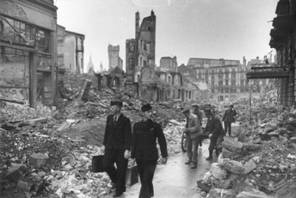
In the dusk, and especially in the early morning hours, civilian refugees could be seen everywhere. Pulling away with their few belongings in worn out clothes, and all looking very exhausted carrying infants on the arm or with older children by the hand. Some had tied up their basic belongings on small carts which they laboriously, with gazing eyes, drew after themselves through the rubble. What was very confusing for James, was that it seemed as if there were civilians moving in all directions. "Where are people actually going? Everything lies in ruins "- thought James.
What he and his comrades could not know was that the entire northern part of Germany was one big jumble of both refugees from the east, and local refugees from both north and south who went back to some sort of starting point. Old people, children in dirty and tattered clothes, all with blank and staring eyes - as they walked in a daze without heed of the world around them. Although James and his comrades were used to seeing all kind of misery from the war, this was markedly more depressing than before and most of all looked like Armageddon on earth. Expectations for the final part of the war, which perhaps would be the liberation of Denmark, was obviously not very high. James and his companions agreed that now it was just a matter of getting through without taking unnecessary risk... now being so close to the end of the war.
uuuuu
May 5th 1944 - Denmark
Rumours that the British troops were on their way up north to take control of Denmark was already out amongst the majority of the population. Part of the defeated German troops had already laid down their arms and had started to prepare their long march home. It was obviously done on foot and under tight command. Amongst the defeated German troops who were already on their way home to an uncertain future, there were still a sense of pride and honour. Many of the German troops almost felt a kind of relief and there was no doubt that the long awaited capitulation was welcomed by many of the German soldiers.
Danes had begun to huddle together in several places at key transportation hubs, such as in the larger provincial towns up through Jutland. Everyone, young and old, so excited to receive the heroes who had secured a final Allied victory. Of course it was a wide perception in the Danish population that Denmark, throughout the war, had supported the Allied effort without hesitation. The memory was short and not until many years later, the real picture of the official Danish role during the war appeared more and more nuanced. In fact the allied had serious doubts for the first few years during the German occupation of Denmark where the loyalty lie. With the Germans or with the Allies.
Not until the resistance started to get organised starting to make life complicated for the German occupation forces through sabotage, the Allies understood where the loyalty of the Danish population actually were and they could now disregard the role of the politicians, that in their attempt of securing Denmark a position as a neutral nation, had needed to accept different initiatives by the Germans from giving access to the agricultural production to German forces to actually allowing Danes to volunteer to the German Wehrmacht. After the “General Strike” where the Danish population said NO, the Allies understood that the population were on the Allies side!
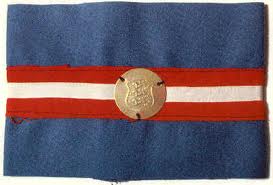
However all these considerations were not on the Danish populations mind these early days of May. Everybody were just thankful that the war was finally over with without too much bloodshed in this small country with "the green beaches surrounded by the salty sea". The popular RAF patterned round hats were found out from hiding, after being banned by the German occupation forces earlier in the war. Dannebrog weighed everywhere and everyone was now ready to welcome and celebrate the British "Tommies" when they would finally be rolling up from the south. In several provincial towns the English units were stopped by the crowd to be celebrated by the Danes.
It had now been promulgated in the press that some British airborne forces would arrive in Copenhagen by air to officially and as a symbol of victory, to take command of the city. In the rest of the country there was information out that the Allied would continue to move up in large numbers from the south, mainly composed of English troops.
While one would also expect large German troop movements on their way south, it was recommended to the population to avoid any confrontation with these beaten forces and to maintain peace and order among the people and no self reprisals, either towards the German troops or people in the community who may be suspected of pro-German activities. Self reprisals on locals was, unfortunately, done in big style and was often based on either misunderstanding or motivated by personal reasons. Criminal elements of society also used the confusion to commit crime under the guise of freedom fighters' status and use of loaded pistols. However, the vast majority of Danes kept in the skin and behaved on the whole civilized after the liberation.
uuuuu
In the centre of Aarhus, the "capital of Jutland", the red-haired Danish girl, Norma Alvi, walked around with a friend enjoying the spring air ... Norma thought: "Imagine that the war finally was over. No more limitations from an alien power”. It would certainly be a wonderful summer and a bright and promising future awaited surely just around the corner.
uuuuu
The First Royal Dragoons, including James and his comrades rolled into central Aarhus. They had noticed how the remarkably fine state all Danish cities were. No war injuries and damaged buildings. The people seemed to have 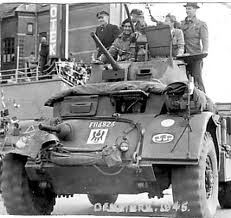 lived through the war without major injury. There was not the depressing war sentiment that had been characterized in especially the northern and western part of Germany. People were happy and welcoming the allied troops. Virtually everywhere at major traffic hubs people stood with Danish flags and cheered. In the larger cities, and especially here in Aarhus, the cheering people were crowding around the vehicles and all wanted to mingle with the young soldiers including James and his comrades.The most urgent Danes, were taken up in the vehicles as they drove through the town. Human crowds were screaming and shouting and there were many photos taken of the columns. Everyone was happy, festive and for the first time James felt himself as a hero and let himself be celebrated. Never before in his active military career, had he been received so kindly and warmly as in Denmark in the early days of May 1945 .
lived through the war without major injury. There was not the depressing war sentiment that had been characterized in especially the northern and western part of Germany. People were happy and welcoming the allied troops. Virtually everywhere at major traffic hubs people stood with Danish flags and cheered. In the larger cities, and especially here in Aarhus, the cheering people were crowding around the vehicles and all wanted to mingle with the young soldiers including James and his comrades.The most urgent Danes, were taken up in the vehicles as they drove through the town. Human crowds were screaming and shouting and there were many photos taken of the columns. Everyone was happy, festive and for the first time James felt himself as a hero and let himself be celebrated. Never before in his active military career, had he been received so kindly and warmly as in Denmark in the early days of May 1945 .
In the middle of Frederiks Allé in Aarhus, the column stopped. There was confusion over where to stay in Aarhus and a patrol was sent out to find a suitable location. James thought it was a good opportunity to light the primus and brew a good cup of tea while they enjoyed the human masses curiosity and attention. Many people, especially young people, huddled together and begged for real
cigarettes. There was a lot fraternizing with those lightly dressed cute Danish girls who were eager to try out their best English skills.
uuuuu
 Norma and her friend watched the happy and suntanned English Tommies from afar. They looked both seasoned and yet quite young in their worn uniforms. Everyone had either to go shaking hands or give a hug to the charming and smiling English Tommies. Especially Norma, who had gotten a good eye for one of the uniformed soldiers who sat sprawled in a dented and torn vehicle called a "Jeep", while he sipped a tin cup.
Norma and her friend watched the happy and suntanned English Tommies from afar. They looked both seasoned and yet quite young in their worn uniforms. Everyone had either to go shaking hands or give a hug to the charming and smiling English Tommies. Especially Norma, who had gotten a good eye for one of the uniformed soldiers who sat sprawled in a dented and torn vehicle called a "Jeep", while he sipped a tin cup.
The soldier sat and chatted jovially with a group of young Danes who stood around his vehicle. "He's a nice guy" - she whispered to her friend as she giggled. James had become aware that he was seen at a distance from the beautiful red haired Danish girl. A pair of eyes were sent and Norma and her friend finally found the courage up to go closer to the jeep. After a short time Norma and her friend were chattering and Norma thought that this British soldier, who called himself Les, but was called James by his comrades, accounted for all the good that came with the liberation of Denmark. Norma and her friend happily explained about all the Danish they could think off , and looked all out to please James a lot. He just sat and listened and thought in his mind that it was great that the war was nearly over so he could go ahead and create a new life. James and his unit stayed in Aarhus, which suited James very well.
The British troops stay was marked by a mixture between guarding and security tasks, and enjoyable leave from the service. Leave was used to enjoy spring in the city. It was a wonderful and carefree time for the war-weary British Tommie, who quietly got a "soft" and happy start to the new future, a future in freedom. The thoughts went often back to their families in England though.
After his service in Denmark, James returned to civilian life in war scared London and again see his family that he had not seen in something that felt like an eternity. James also decided to finish his interrupted mechanic training and could now start thinking about the future.
In 1952 he decided to return to Denmark. It would obviously be to Aarhus where he had both warm and happy memories. Naturally, everything was different now 7 years after liberation, but he soon fell into and was nicely received by the locals. Together with a companion, James started an automotive shop which they owned until 1967. Shortly after his return, he was united with the love of his life ....... the red-haired Norma Alvi, among friends called "Misser".
James and Norma quickly found out that it should be them for life and decided to get married. They both had the courage to be self-employed as everything seemed bright in Denmark at that time. After a short time, they together opened their own antique shop in the centre of Aarhus. They began to build a fantastic collection of dolls and toys, which later ended up being known as "MissersDollMuseum."In 1976 they decided to move their collection to the little, but also very picturesque town of Ebeltoft sourounded by nature and the sea. At the same time James and Miss started a second store in Aarhus, known amongst locals as "The Curiosity Shop", which was to negotiate used clothing and rent festive costumes. All the while James led the museum in Ebeltoft, whilst Misser managed the shop in Aarhus.